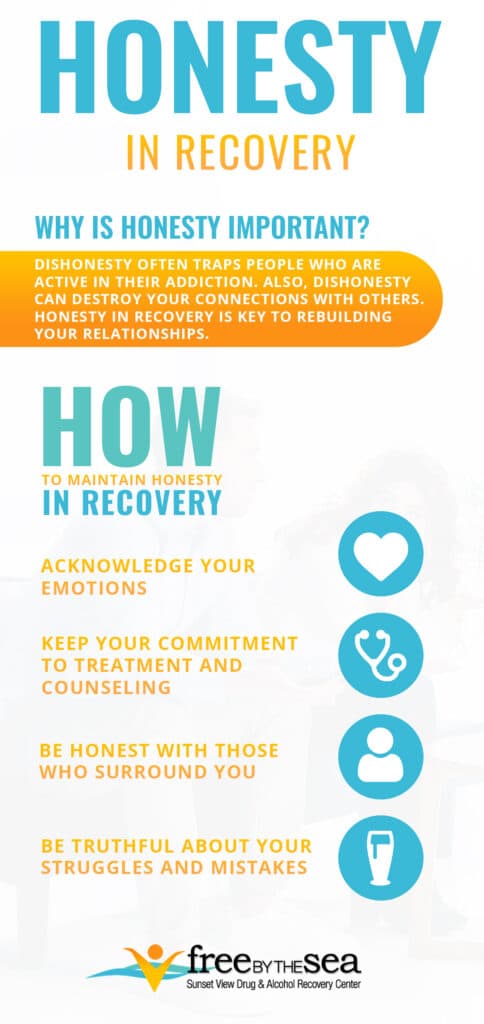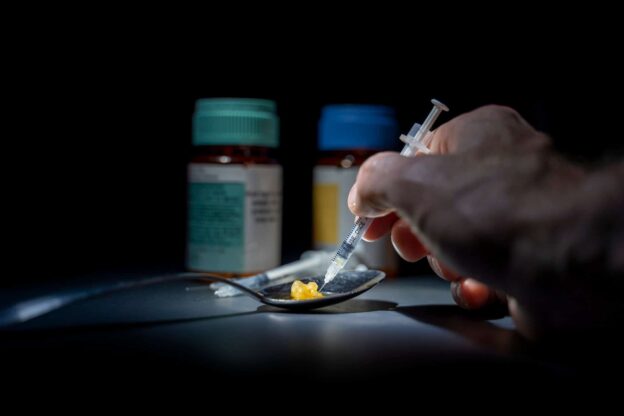Honesty is one of the most respected moral characteristics of all. Being honest isn’t just about telling the truth. Rather, it’s about being real and genuine with yourself and showing up authentically. Honesty in recovery from addiction promotes a sense of openness. In the same way, you will feel a sense of empowerment as you show up consistently as your authentic self.
“We admit we are powerless over alcohol and that our lives had become unmanageable.”
–Step 1, Alcoholics Anonymous
It is both important and necessary to pay close attention to honesty in recovery. For this reason, the first step in the AA program is spiritual in nature. You have to be truthful to others, But just as important, you need to be honest with yourself.
You are more prone to relapse if you do not develop honesty as a personal quality. This is why honesty has to become a daily practice until it becomes second nature. But why is it that some people in the recovery community continue to be dishonest? There are many possibilities, but the following are three reasons why honesty in recovery is so important.
Honesty in Recovery: Understanding That Dishonesty is a Common Relapse Trigger
Quite often, lying becomes a habit because of an underlying fear of natural consequences. In other words, lying is a way to protect yourself. But lying is an unproductive coping skill. While it is completely normal to struggle with getting caught in a lie, the key is to just fess up. Acknowledge your dishonesty as soon as possible.
Failing to do so could not only bring up feelings of guilt, but it could also put your sobriety in jeopardy. A great way to track your honesty in recovery is to keep a journal. In doing so, you will be able to monitor your behavior and target times of dishonesty.
Dishonesty Will Make You Feel Trapped
Dishonesty often traps people who are active in their addiction. Likewise, dishonesty can make you feel trapped in your recovery. Denial is common when you lack the motivation or encouragement you need for facing challenges. After all, it may seem easier to hide from a challenge than face it. But it is difficult to make any sort of progress unless you can openly recognize your challenges.
Once you recognize your problems, you will be able to take the appropriate actions to solve them. It’s important to face things as they come. While managing life without depending upon substances may pose as a challenge initially, your honesty in recovery is your priority. Practice honesty daily. Just like working out at the gym, practicing honesty takes both practice and patience.
Dishonesty Destroys Relationships
Honesty in recovery is key to rebuilding your relationships. Your family and friends can be devastated by your untruthfulness. In addition, your sponsor or therapist may have a difficult time detecting progress and treating you if you continue to be dishonest. Prior to getting clean and sober, you valued your dishonesty about your addiction over the ones you love. Now that your recovery is your priority, you can rebuild the foundation of the relationships that you once had with the people that you love and care about.
How to Maintain Honesty in Recovery
Coming to terms with the truth of your challenges and difficulties is key to overcoming substance abuse. It can be hard to face the truth about your situation. But, being completely honest with yourself is the first step to improving your life and beginning your journey to recovery from addiction.
Many individuals who are working through recovery, especially those in the early stages of the journey, may wonder how to continue being honest. It’s important to understand how to incorporate and maintain a true sense of honesty in recovery from substance abuse. So, if you are currently working to overcome addiction, it is best to learn more about honesty in recovery and how it can help contribute to your success. Continue reading to also learn about the different ways that you can maintain honesty in recovery.
Acknowledge Your Feelings and Emotions
It is, unfortunately, common for recovering individuals to experience feelings of guilt, shame, and even self-doubt. The truth of the matter is that substance abuse often leads people to feel unworthy, hopeless, and helpless. So, many people in recovery encounter negative emotions on a regular basis, particularly throughout the early stages of recovery.
If you experience these emotions, it is best not to avoid or ignore them. Suppressing or ignoring them will only lead to more emotional distress and pain. Instead of denying the presence of these feelings, acknowledge that they exist. Respect the fact that they are affecting you.
Once you acknowledge these feelings and emotions, however, it is necessary to address them. You can address guilt, shame, doubt, and other emotions in the following ways:
- Write about them in a journal.
- Discuss them with a therapist.
- Continue opening up in group therapy about these emotions.
- Engage in safe, sober, and enjoyable activities to help you work through difficult feelings. (i.e. exercise, art, spending time with people who love and support you, etc.)
Keep Your Commitment to Treatment and Counseling
Often, those who are on the path to a life without addiction experience a newfound sense of freedom. This can be beneficial for the most part but, for some, this freedom may translate to a lack of motivation. Individuals may begin to feel that since they are no longer suffering from alcoholism or drug abuse, they don’t need treatment anymore. But this could not be further from the truth.
While you are pursuing a life that is free from addiction, be sure to keep your commitment to therapy and treatment. Whether you are done with your residential and outpatient treatment programs, or you are just beginning, counseling will be necessary for you.
Counseling for addiction is one of the most effective components of the recovery process. If you are in an alumni program or taking part in a recovery group, you should make sure to be present. Remain committed to your recovery goals. This will help you to maintain healthy communication with others regarding your journey.
Remaining on track with your treatment and therapy will also help you to maintain accountability. Being accountable to yourself and others will assist you in staying on the path to recovery and avoiding relapse. It will also provide you with therapists and fellow recovering individuals with whom you can honestly share your experiences, challenges, and victories.
Be Honest With the People Around You
Denying or simply avoiding the truth is often the first resort when facing a difficult or awkward situation. Perhaps throughout your time in active addiction, your family members or friends experienced emotional hurt. Addressing these issues can be challenging. It often seems easier to sweep them under the rug or run away from them altogether. But, honesty is imperative in rebuilding broken relationships with the people around you.
Be honest with your spouse, children, siblings, parents, and other family members or friends. Tell them the truth about what you’ve been through and what you are currently experiencing. It is important that you avoid denying the truth about the impact of your addiction on their lives.
Your honesty and openness with your loved ones will help to bridge the gap between you and them. It will also help to create an open way of communication within your family structure. Finally, being honest with the people you love will help to involve them in this new journey and stage in your life.
Be Truthful About Your Struggles and Mistakes
Relapse is not just about returning to substance abuse. In other words, actually using alcohol or drugs is not the only type of relapse that exists. There are stages of relapse, including mental and emotional relapse. If you’re experiencing the symptoms of emotional or mental relapse, be sure to honestly discuss these challenges with your counselor. This will help to prevent physical relapse from occurring.
If, however, you do happen to come dangerously close to physically relapsing, or you experience an actual relapse, reach out for help. You do not need to feel guilt or shame about your struggle. Instead, speak with the treatment specialists who have been helping you throughout your recovery journey, or consider re-enrolling in treatment. There is no shame in doing what you need to do in order to overcome addiction once and for all.
Do you have any other types of addiction or problems in your life? Are you struggling with mental health challenges? Note that excessive gambling, codependency, anxiety, depression, and many more challenges can cause issues in the recovery process.
If you are noticing any of these or other difficulties in your life, it is critical that you speak openly and honestly about it. Discuss these issues with your therapist. Open up to your accountability partner(s). Write about it and address these struggles head-on. This will help to eliminate further problems.
Finding Hope for Recovery at Free by the Sea
Honesty in recovery is not always easy to maintain. It is often difficult to share the truth about what you’re thinking and feeling, especially as you work toward recovery from addiction. But, the more honest and truthful you are, the more likely you are to become and remain free from substance abuse.
Free by the Sea encourages addicts or people impacted by a loved one with addiction in the Pacific Northwest, including Washington (Vancouver), Oregon (Portland), Alaska, and surrounding areas to contact us for guidance and assistance. Allow our team to work with you as you move forward, leaving addiction in your past!





